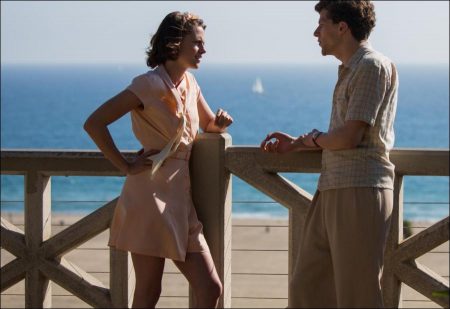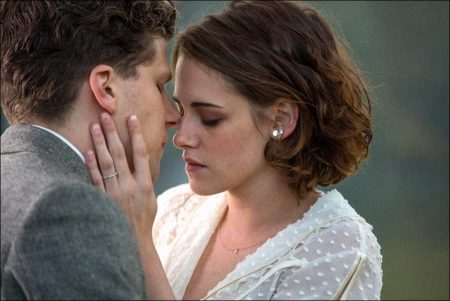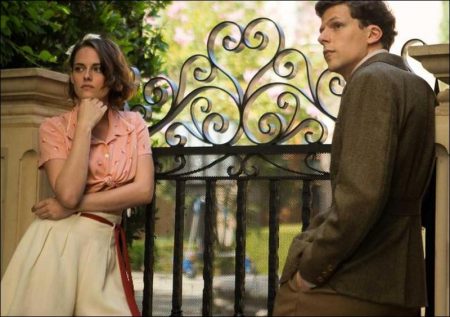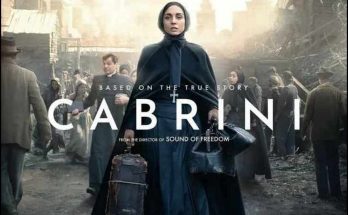The director’s new film isn’t without resonance, writes Richard Lawson from Cannes, but is too preoccupied with its least interesting character.
There are maybe three different movies fighting against each other in Woody Allen’s new film, Café Society, which opened the 2016 Cannes Film Festival on Wednesday night. It’s part creakily nostalgic ode to Old Hollywood, part satiric appreciation of the Jewish-American male’s romantic neuroses, and part wistful, half-serious rumination on the ephemeral fixations of love.
I like that last movie, Allen in his reflective years revisiting a familiar, old trope—the sexual-social peccadillos of the heterosexual intellectual—with a final huff of “Eh, who knows?” Café Society ends on a pleasing note of bittersweet ambiguity—or perhaps there’s nothing ambiguous about it, Allen arguing that there is certainly some uncertainty in life, always a wondering about what could be, a speculation that never quite merits seeking out answers.
But the other two-thirds of this disjointed movie, which starts in 1930s Los Angeles and ends in the New York City social scene referenced in the title, is Allen at his most lazily Allen-ish, Jesse Eisenberg’s aspiring somebody (what he does to “make it” doesn’t really matter) rattling through scene after scene of fretting dully over women, all of whom are inexplicably attracted to this irksome, self-involved jerk.
Those women are played by Kristen Stewart and Blake Lively, both giving appealing performances. (Though, Stewart’s cadence is perhaps a bit too modern.) Neither character—the Hollywood assistant Eisenberg’s Bobby courts nor the New York society gal he eventually marries—is very fleshed out, but these two often unfairly maligned actresses do their best at pretending that Bobby is worth anyone’s time.
Buried underneath all of Café Society’s cheap-looking period gloss—the cinematography, by Vittorio Storaro, is oddly lush and intricate and garish for an Allen picture—is a simple story of a young man exploring the sense of possibility he finds in women. The movie treats its female characters as territory to be discovered, resources to be used, in Bobby’s journey toward manhood. There will always be another girl flickering and flaring on the outskirts of a man’s life, roads not taken more than people not known, and there is something a little sad, and a little sweet about that, Café Society suggests.
Which, sure. At 80 years old, Allen is well positioned to look back at the entanglements of youth with a knowing sigh. But much of Café Society is tainted by a cynical, transactional view of (straight) sex and romance, Allen perhaps setting his film in the shimmery past to protect himself from the glare of social consciousness. There’s a truly hideous scene in which Bobby hires a prostitute (played by Anna Camp with her usual despite-it-all dignity) who shows up late, annoying Bobby, and then practically begs him to sleep with her out of a desperate need for validation. Allen used to be somewhat insightful about women—Hannah and Her Sisters at least had a glow of empathy to it—but his view on the sexes has gotten narrower and far less charitable as he’s aged.
Bobby and his uncle, a high-powered agent played with alarming flatness by Steve Carell, consistently forgive their own loutishness as they go, preventing the film from achieving any truly honest self-assessment. Ultimately, Allen seems not nostalgic for the particular era of his birth—the dread-tinged time between the Depression and World War II—but instead for a certain callowness that is no longer celebrated the way it used to be. Only one man, Bobby’s gangster brother, played by Corey Stoll, gets any comeuppance for his loutishness, but it’s for a number of murders.
Bobby and his uncle—both philanderers and objectifiers of women—don’t need to be punished, of course, but some sense of balance or fairness or perspective would be appreciated here. Especially when the movie is so stocked with talented actresses giving winning performances. There’s Stewart and Lively, but also Parker Posey as a Dorothy Parker–esque friend, Jeannie Berlin as Bobby’s plainspoken mother, and a warm Sari Lennick as his sister.
Still, when Café Society reaches its quiet conclusion, Allen has managed to conjure up some pensive feeling, softening his movie’s jarring pointiness. The film is nowhere near as effective as, say, Midnight in Paris’s murmuring about time, or his earlier dramas’ rueful interpersonal wisdom, but it’s not entirely without resonance. I just wish the film wasn’t so fascinated by the least interesting character wandering around this whole crazy scene called life.
Related: View full production notes for Café Society
Visits: 114





